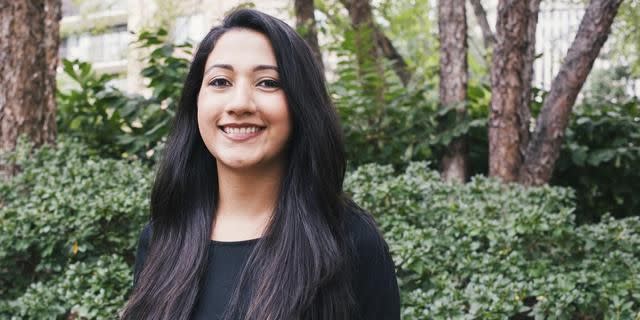Think You Suffer from Burnout? Just Try Working in Climate Science

Last month, Conservation International's Shyla Raghav returned from a ten-day silent meditation retreat in Delaware to reinvigorate her commitment to working on the climate crisis. There, she spent 12 hours a day in meditation, with no access to phones, media, books-and no exercising.
The 33-year-old leads climate change action at the nonprofit environmental organization that, through building partnerships with companies and communities, empowers societies to think sustainably about nature. Her work in the sector is fulfilling, but the gravity of the issue (just this month, the U.N. warned in a report that one million species are now at risk of extinction due to human activity), can take its toll.
Retreats like the one in Delaware, she says, renew her sense of hope and optimism about climate action. Raghav spoke with ELLE.com about the burnout she experiences working to save the planet-and what her hope is for the future.
Burnout is now an official diagnosis classified by the World Health Organization as a, "syndrome conceptualized as resulting from chronic workplace stress that has not been successfully managed." Do you experience burnout from working on the climate crisis?
The burnout comes when it sinks in that so much of this [crisis] is out of our direct control. It can be really hard for people who work on things like climate change, things that seem so difficult to solve, so out of our control.
What keeps you going?
I went to the a retreat in Delaware, which really helped. I'm an internal optimist, and I think even though I experience burnout, what keeps me going is understanding and recognizing that we can't afford to not keep trying and working on climate change. I feel a sense of responsibility and urgency, and I also know that we have a short timeframe. The decisions that we make today are probably the most important of any time in the past. It's because we know the science, we know we have a limited carbon budget, and once we burn through that carbon budget, then our chances of really limiting the worst impacts of climate change diminish significantly. That's what keeps me going, is knowing that we have a narrow time frame, and that the decisions we make today are so incredibly important, so I feel like whatever burnout I experience along the way is manageable or I'm able to push through it because of the importance of what we're dealing with.
Individual actions to save the climate are great, and I do them. I worry when people think they're most important and enough.
They're not enough.
We didn't create the system that pollutes our planet, and our individual actions won't fix it.@MichaelEMannhttps://t.co/7XRWOEf2Pf- Alexandria Villaseñor (@AlexandriaV2005) June 3, 2019
In September, UN Secretary-General António Guterres will host the 2019 Climate Action Summit to address the climate crisis, which the UN is calling, "the defining issue of our time." How is Conservation International Participating in the discussion?
We're working directly with the secretary general's team and a number of countries to try and develop clear commitments and actions that will move the needle on the solutions to climate change. One of those things is finance. We need high levels of finance to redirect resources toward the solution, so reducing subsidies for the problem and increasing financial incentive for those solutions. Currently the amount of finance that promotes deforestation is 40 times higher than the amount of green finance, and that's because of the agricultural subsidies, lending policies, and perverse incentives that are promoting and incentivizing deforestation, so we need to redirect billions and billions of dollars so that they're going toward green sources of finance. These are some of the big things that we're taking up at the summit with partners and with countries and with the secretary general's team, which I think will really have a big chance of success.
The youth climate strike is another really great massive global movement to challenge climate change (we've spoken to several really amazing young U.S. activists)-how do you see them effecting change?
They've definitely added wind to our sails. The youth climate movement really needed the voice of young people, because climate change is more than just an environmental issue. It's also an equity and injustice issue. There's such a racial disparity and who's bearing the brunt or even disparity between countries, within countries, but I think this has also highlighted the fact that there's also intergenerational equity. Just as we need to be thinking about how we support vulnerable marginalized communities that are suffering the most, we also have to think about how we're leaving the problem to future generations. I think a lot of people are taking notice of this issue, because of the courage of young people to speak up.
('You Might Also Like',)

